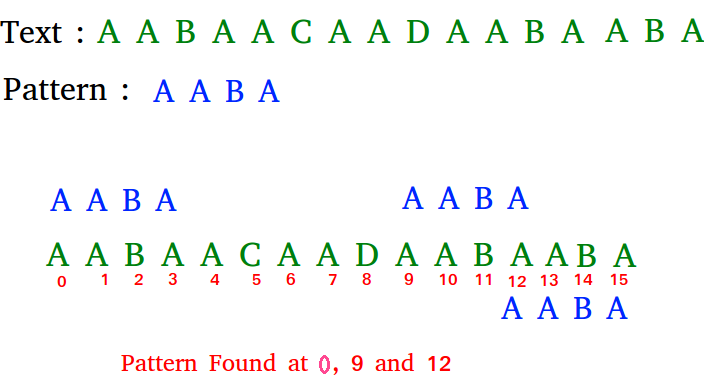Dado un texto txt[0..n-1] y un patrón pat[0..m-1] , escriba una función search(char pat[], char txt[]) que imprima todas las apariciones de pat[] en txt [] . Puede suponer que n > m .
Ejemplos:
Input: txt[] = "THIS IS A TEST TEXT"
pat[] = "TEST"
Output: Pattern found at index 10
Input: txt[] = "AABAACAADAABAABA"
pat[] = "AABA"
Output: Pattern found at index 0
Pattern found at index 9
Pattern found at index 12

La búsqueda de patrones es un problema importante en informática. Cuando buscamos una string en el bloc de notas/archivo de Word, en el navegador o en la base de datos, se utilizan algoritmos de búsqueda de patrones para mostrar los resultados de la búsqueda.
C++
// C++ program for implementation of KMP pattern searching
// algorithm
#include <bits/stdc++.h>
void computeLPSArray(char* pat, int M, int* lps);
// Prints occurrences of txt[] in pat[]
void KMPSearch(char* pat, char* txt)
{
int M = strlen(pat);
int N = strlen(txt);
// create lps[] that will hold the longest prefix suffix
// values for pattern
int lps[M];
// Preprocess the pattern (calculate lps[] array)
computeLPSArray(pat, M, lps);
int i = 0; // index for txt[]
int j = 0; // index for pat[]
while (i < N) {
if (pat[j] == txt[i]) {
j++;
i++;
}
if (j == M) {
printf("Found pattern at index %d ", i - j);
j = lps[j - 1];
}
// mismatch after j matches
else if (i < N && pat[j] != txt[i]) {
// Do not match lps[0..lps[j-1]] characters,
// they will match anyway
if (j != 0)
j = lps[j - 1];
else
i = i + 1;
}
}
}
// Fills lps[] for given pattern pat[0..M-1]
void computeLPSArray(char* pat, int M, int* lps)
{
// length of the previous longest prefix suffix
int len = 0;
lps[0] = 0; // lps[0] is always 0
// the loop calculates lps[i] for i = 1 to M-1
int i = 1;
while (i < M) {
if (pat[i] == pat[len]) {
len++;
lps[i] = len;
i++;
}
else // (pat[i] != pat[len])
{
// This is tricky. Consider the example.
// AAACAAAA and i = 7. The idea is similar
// to search step.
if (len != 0) {
len = lps[len - 1];
// Also, note that we do not increment
// i here
}
else // if (len == 0)
{
lps[i] = 0;
i++;
}
}
}
}
// Driver program to test above function
int main()
{
char txt[] = "ABABDABACDABABCABAB";
char pat[] = "ABABCABAB";
KMPSearch(pat, txt);
return 0;
}
Found pattern at index 10
Complejidad del tiempo : O(m+n)
Complejidad espacial : O(m)
Consulte el artículo completo sobre el algoritmo KMP para la búsqueda de patrones para obtener más detalles.
Publicación traducida automáticamente
Artículo escrito por GeeksforGeeks-1 y traducido por Barcelona Geeks. The original can be accessed here. Licence: CCBY-SA